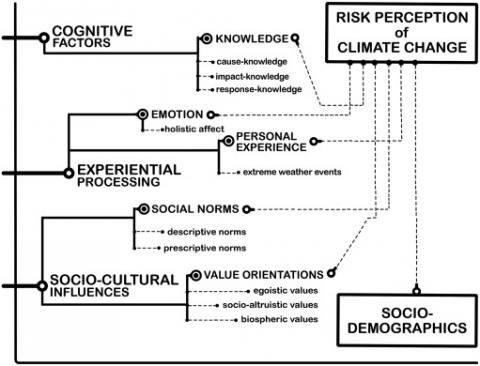The CCRPM is a Risk Perception Model (CCRPM, van der Linden, 2015) and theory of risk perception. The theory integrates three core dimensions of risk which have previously largely been treated as distinct; cognitive factors (e.g., knowledge), experiential factors (e.g., emotion/affect) and socio-cultural factors (e.g., norms, values).

The model was originally applied to the context of climate change but can be adopted for any issue (e.g., see our 2020 paper on coronavirus risk perceptions).
In my early theorizing a precursor to the model (see Helgeson, van der Linden, & Chabay, 2012) included a fourth dimension: "the risky individual" to account for individual differences. Generally, I start the model by including individual differences shown to be relevant to how people perceive risk on a given issue (e.g., gender, ideology, education) and then add the psychological dimensions in consecutive blocks to assess how much explanatory power they add above and beyond basic socio-demographic characteristics. The original rationale for the order of the blocks was broadly the manner in which the theory/literature evolved (from a predominant focus on cognition to affect to norms and values). For my latest thinking on the model, including additions (e.g., the role of trust), please see a comprehensive overview in van der Linden (2017). For applications to specific audiences, e.g., bloggers see van Eck, Mulder, & van der Linden (2020).
Publications
-
Dryhurst, S., Schneider, C. R., Kerr, J., Freeman, A. L., Recchia, G., Van Der Bles, A. M., Spiegelhalter, D., & van der Linden, S. (2020). Risk perceptions of COVID-19 around the world. Journal of Risk Research, 1-13.
-
van Eck, C., Mulder, B., & van der Linden, S. (2020). Climate change risk perceptions of audiences in the climate change blogosphere. Sustainability, 12(19), 7990.
- van der Linden, S. (2017). Determinants and Measurement of Climate Change Risk Perception, Worry, and Concern. In M. Nisbet (Ed.), Oxford Encyclopedia of Climate Change Communication (Vol. 2, pp. 369-401). Oxford, UK: Oxford University Press.
- van der Linden, S. (2015). The social-psychological determinants of climate change risk perceptions: Towards a comprehensive model. Journal of Environmental Psychology, 41, 112-124.
- Helgeson, J., van der Linden, S., & Chabay, I. (2012). The role of knowledge, learning and mental models in public perceptions of climate change related risks. In A. Wals & P.B. Corcoran (Eds.) Learning for sustainability in times of accelerating change. Wageningen Academic Publishers, Wageningen, NL.
The model explains about 50% to 70% of the variation in climate change risk perceptions, for replications in Canadian and Australian samples (see Bradley et al., 2020; Lacroix et al., 2020; Xie et al., 2019).
Some non-UK replications
- Xie, B., Brewer, M. B., Hayes, B. K., McDonald, R. I., & Newell, B. R. (2019). Predicting climate change risk perception and willingness to act. Journal of Environmental Psychology, 65, 101331.
-
Bradley, G. L., Babutsidze, Z., Chai, A., & Reser, J. P. (2020). The role of climate change risk perception, response efficacy, and psychological adaptation in pro-environmental behavior: A two nation study. Journal of Environmental Psychology, 101410.
-
Lacroix, K., Gifford, R., & Rush, J. (2020). Climate change beliefs shape the interpretation of forest fire events. Climatic Change, 159(1), 103-120.
The 2015 Climate Risk Perception Scale
You do not need my permission to use the scale from the 2015 JEVP paper in your surveys as long as you cite and credit the original article. You can find all of the survey items and scales in this document here.
The 2020 COVID-19 Risk Perception Scale
You do not need my permission to use the scale from the 2020 JRR paper in your surveys as long as you cite and credit the original article. You can find all of the data and survey items and scales in all ten languages for free here on our Open Science Page: https://osf.io/jnu74/
